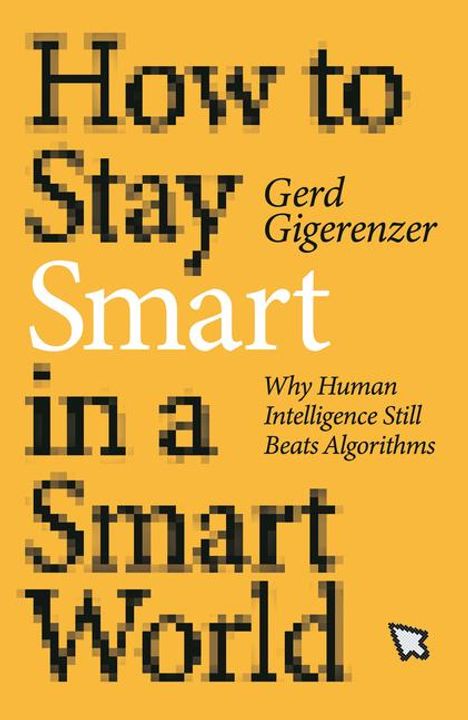Gerd Gigerenzer: How to Stay Smart in a Smart World, Kartoniert / Broschiert
How to Stay Smart in a Smart World
- Why Human Intelligence Still Beats Algorithms
(soweit verfügbar beim Lieferanten)
- Verlag:
- MIT Press, 09/2025
- Einband:
- Kartoniert / Broschiert
- Sprache:
- Englisch
- ISBN-13:
- 9780262548441
- Artikelnummer:
- 12134798
- Umfang:
- 320 Seiten
- Gewicht:
- 368 g
- Maße:
- 224 x 146 mm
- Stärke:
- 21 mm
- Erscheinungstermin:
- 23.9.2025
- Hinweis
-
Achtung: Artikel ist nicht in deutscher Sprache!
Weitere Ausgaben von How to Stay Smart in a Smart World |
Preis |
|---|
Klappentext
How to stay in charge in a world populated by algorithms that beat us in chess, find us romantic partners, and tell us to "turn right in 500 yards."
Doomsday prophets of technology predict that robots will take over the world, leaving humans behind in the dust. Tech industry boosters think replacing people with software might make the world a better place--while tech industry critics warn darkly about surveillance capitalism. Despite their differing views of the future, they all seem to agree: machines will soon do everything better than humans. In How to Stay Smart in a Smart World, Gerd Gigerenzer shows why that's not true, and tells us how we can stay in charge in a world populated by algorithms.
Machines powered by artificial intelligence are good at some things (playing chess), but not others (life-and-death decisions, or anything involving uncertainty). Gigerenzer explains why algorithms often fail at finding us romantic partners (love is not chess), why self-driving cars fall prey to the Russian Tank Fallacy, and how judges and police rely increasingly on nontransparent "black box" algorithms to predict whether a criminal defendant will reoffend or show up in court. He invokes Black Mirror, considers the privacy paradox (people want privacy but give their data away), and explains that social media get us hooked by programming intermittent reinforcement in the form of the "like" button. We shouldn't trust smart technology unconditionally, Gigerenzer tells us, but we shouldn't fear it unthinkingly, either.
Biografie
Gerd Gigerenzer ist der in Wissenschaftskreisen derzeit meistzitierte deutsche Psychologe. Nach Lehrtätigkeiten in Konstanz, Salzburg und Chicago ist er heute Direktor am Max-Planck-Institut für Bildungsforschung in Berlin, wo er den Bereich Adaptives Verhalten und Kognition leitet. Dort erforscht er u. a. Risikoverhalten und -kommunikation, die Natur sozialer Intelligenz und schließlich, wie Menschen mit begrenzter Zeit und begrenztem Wissen Entscheidungen treffen. Seine Forschungsarbeit ist interdisziplinär und berührt die Fachrichtungen Ökonomie, Informatik, Psychologie, Mathematik, Anthropologie und Biologie.§Er hat zahlreiche internationale Auszeichnungen erhalten, so auch den Preis der renommierten American Association for the Advancement of Science (AAAS)

